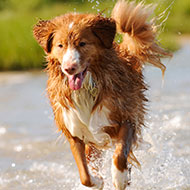
Test designed to combat inherited disease
The Kennel Club has approved a new official DNA testing scheme for Juvenile Addison’s disease (JADD) in the Nova Scotia Duck Tolling Retriever, following a consultation with the Breed Health Coordinator on behalf of the breed clubs.
JADD is an inherited disease that stops the production in the adrenal gland of hormones used to control potassium and sodium levels in the blood. Signs of JADD usually appear at around five months old. Affected puppies will often be tired, weak and off their food with vomiting and diarrhoea.
The test assesses a dog’s risk of developing the disease, based on how many copies of the JADD gene variant a dog has. Tested dogs will be recorded on the Kennel Club systems as either:
- minimal risk (0) - No copies of the JADD gene variant. At minimal risk of developing the disease
- minimal risk (1) - One copy of the gene variant, but still at minimal risk of developing JADD. May pass a copy of either the normal or abnormal gene to future puppies
- increased risk (2) - Two copies of the gene variant. An increased risk of developing the disease. An estimated 75 per cent of dogs with two copies of the variant will develop JADD.
Results are only recorded for individual dogs, and progeny cannot be assigned as ‘hereditary clear’ as the test only evaluates a dog’s risk of developing the disease.
There is currently only one laboratory offering the JADD DNA test; the University of California (UC Davis). The owner of the dog will be required to send results to the Kennel Club themselves, as it currently has no agreement with the laboratory to send DNA results directly.
The Kennel Club has also stated that it will monitor the health of dogs for which owners supply test results, in the hope that this will contribute to future research into genetic variants that are a risk factor for JADD.



 The latest
The latest